September 26, 2025

The essential skills for success in behavior analysis jobs encompass:
These skills are not merely beneficial; they are crucial for Board Certified Behavior Analysts (BCBAs) striving to deliver effective interventions. Have you considered how these competencies can foster positive client relationships and adapt to the evolving demands of the field? By honing these skills, BCBAs enhance both individual and organizational success, positioning themselves as leaders in the industry.
The demand for Board Certified Behavior Analysts (BCBAs) is surging, with job listings projected to increase by 58% in 2024 alone. This remarkable growth underscores a pressing need for professionals equipped with essential skills that drive success in behavior analysis roles. As the landscape of Applied Behavior Analysis (ABA) evolves, one must consider: what are the key competencies that BCBAs must master to thrive in this competitive field? This article delves into ten critical skills that not only enhance practitioners' effectiveness but also improve outcomes for clients. Ultimately, these competencies will shape the future of behavior analysis.
Hire ABA serves as a specialized recruitment platform that simplifies the search for behavior analysis jobs for Board Certified Behavior Analysts (BCBAs). With job listings for BCBAs soaring by 58% in 2024, surpassing 103,000, the and specialized recruitment has reached an all-time high. By focusing exclusively on the ABA field, Hire ABA effectively matches candidates with behavior analysis jobs that align with their qualifications and career aspirations. This targeted approach accelerates the hiring process and enhances the overall efficiency of talent acquisition for behavior analysis jobs in the ABA sector.
Employers benefit from a focused talent pool, while candidates enjoy a more tailored job search experience. Successful job matching case studies illustrate how platforms like Hire ABA can significantly reduce the time to fill behavior analysis jobs, addressing the pressing issue of unfilled roles—an issue reported by 75-85% of behavior analytic service organizations. Are you facing challenges in hiring qualified BCBAs? Consider how Hire ABA can streamline your recruitment process.
Industry leaders emphasize that specialized recruitment for behavior analysis jobs is crucial to meet the increasing demand for board-certified behavior analysts, particularly as the profession is projected to expand by 22-23% in the coming decade. This alignment of supply and demand fosters a more robust job market and contributes to improved career satisfaction and income potential for behavior analysis jobs. In this ever-evolving landscape, the value of specialized recruitment in ABA therapy cannot be overstated. Take action now and leverage Hire ABA to secure the talent your organization needs.
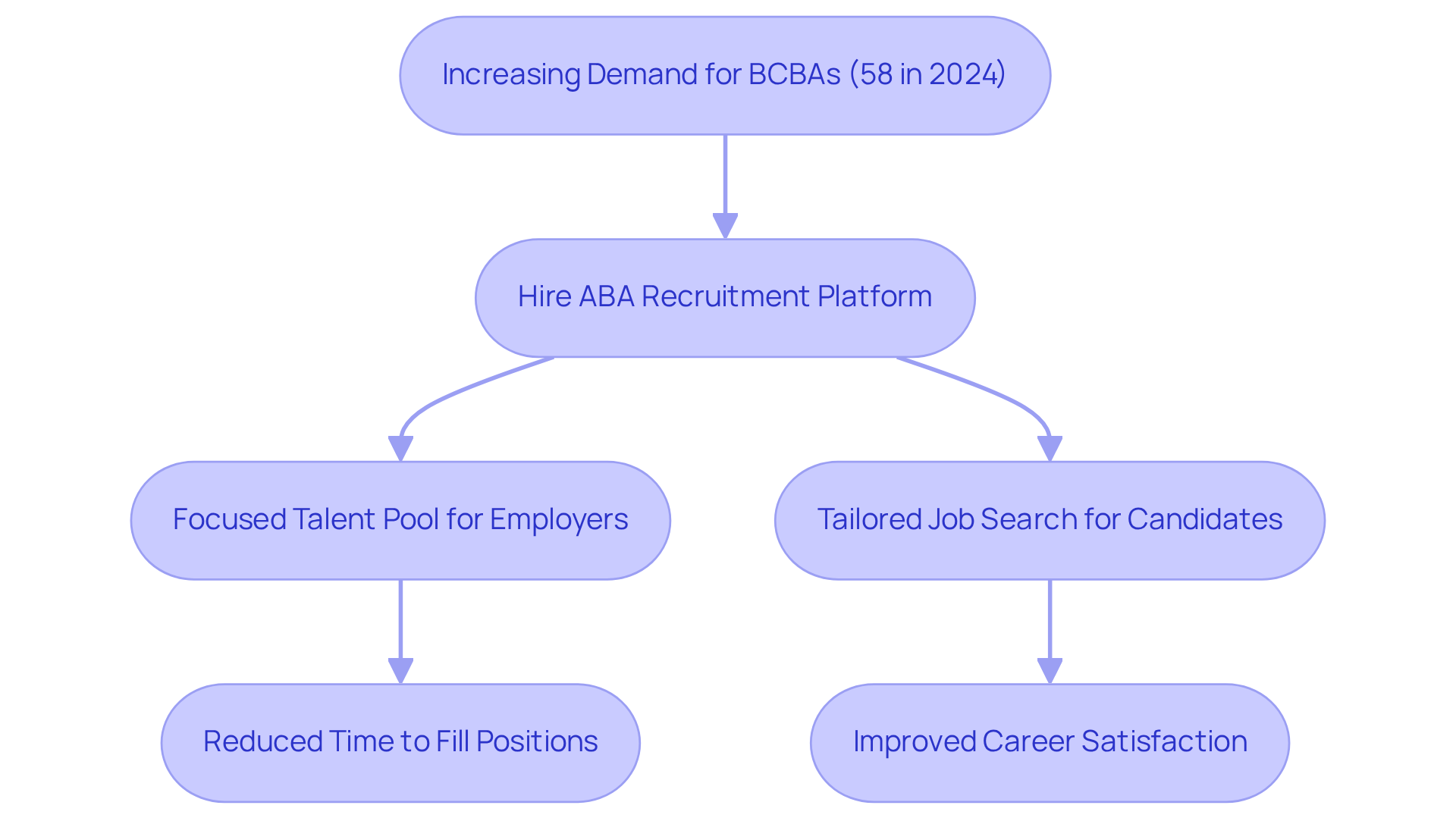
A solid grasp of the core principles and techniques of Applied Behavior Analysis (ABA) is fundamental for success in behavior analysis jobs. Did you know that the , including positions for Board Certified Behavior Analysts (BCBAs), is on the rise? This growing need highlights the importance of mastering essential concepts such as:
To create effective interventions tailored to individual needs, behavior analysts must be skilled in behavior analysis jobs and these techniques. Mastery of ABA is crucial for behavior analysis jobs, as it not only enhances the practitioner's capabilities but also leads to improved outcomes for clients.
As you reflect on your current hiring challenges, consider how these skills can significantly impact your organization. Leveraging the expertise of BCBAs ensures that interventions are not just effective but also customized, ultimately fostering better behavioral health outcomes.
In conclusion, investing in the development of ABA skills is crucial for both practitioners and organizations alike. Embrace the opportunity to enhance your team’s capabilities and drive success in behavior analysis.
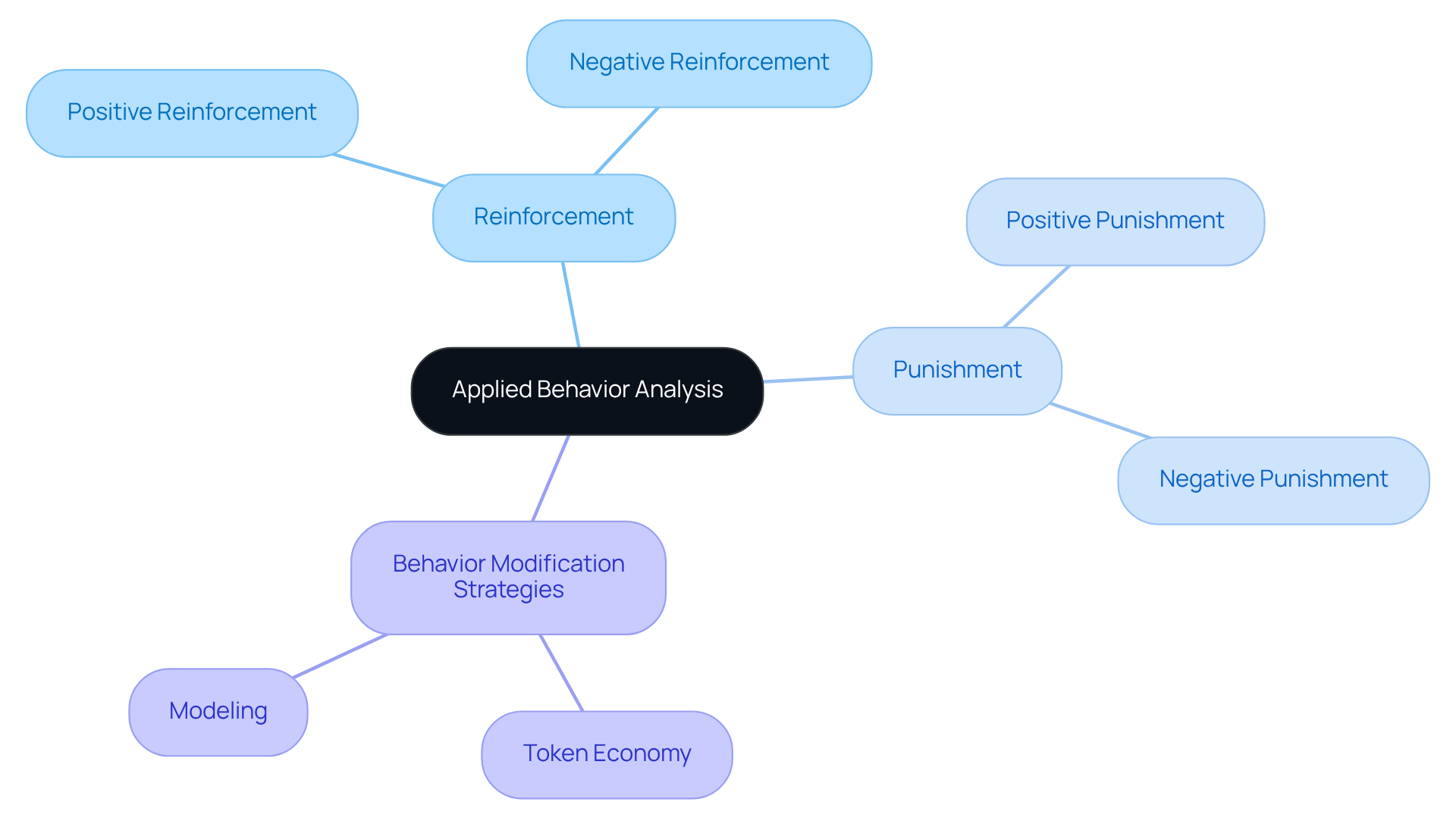
BCBAs must possess excellent communication skills to interact effectively with individuals, families, and multidisciplinary teams. This encompasses the capacity to in comprehensible language, actively hear concerns, and offer clear feedback. Effective communication promotes trust and rapport—vital components for successful therapeutic relationships and cooperative efforts among team members.
Consider the challenges you face in hiring qualified professionals. How can effective communication enhance your recruitment process? By recognizing the importance of these skills, you can ensure that your team not only communicates effectively but also fosters an environment conducive to collaboration and success.
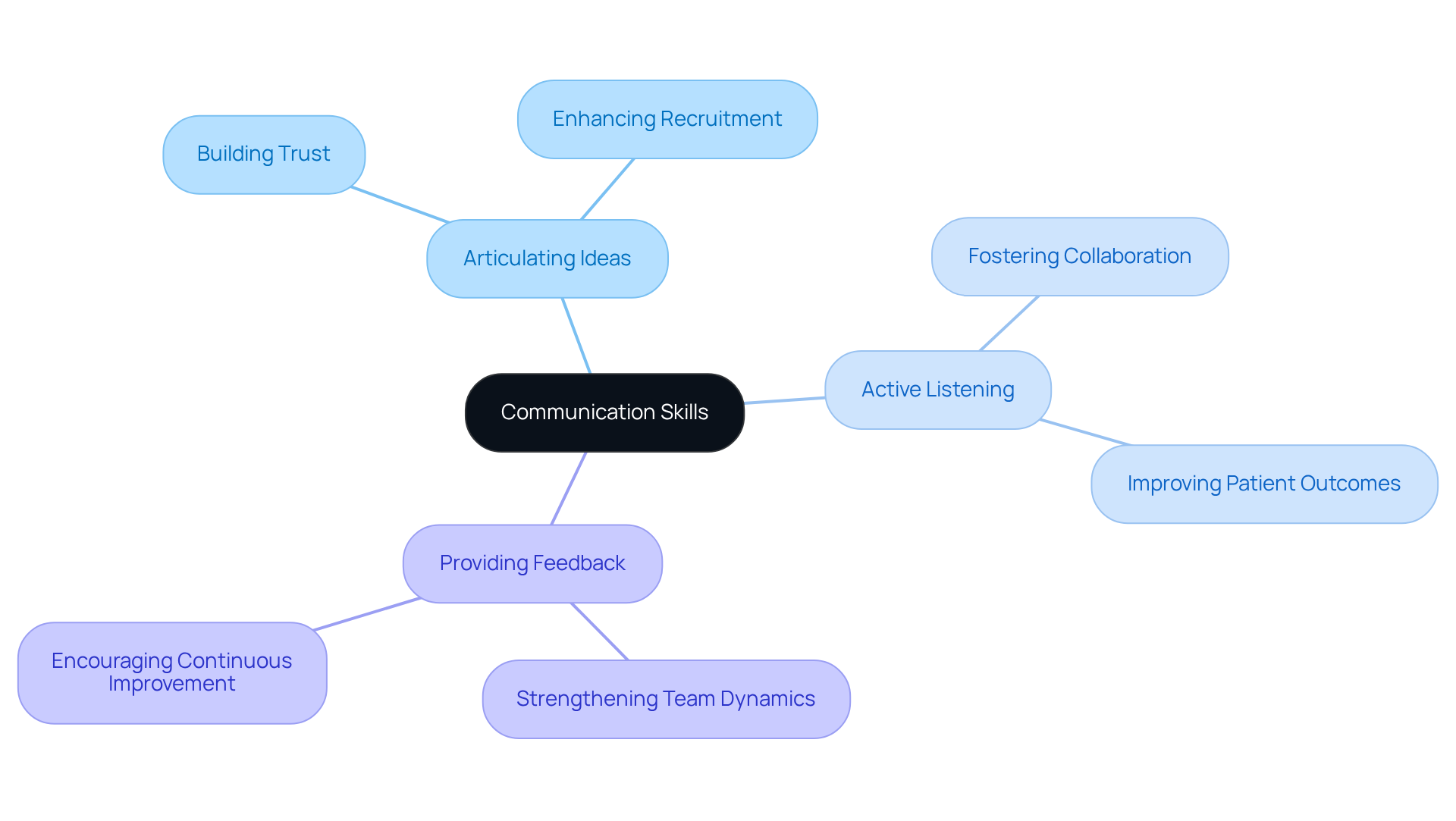
Expertise in data analysis is essential for behavior analysis jobs, as it helps analysts assess individual progress and results effectively. Gathering and interpreting data on customer behaviors is a critical task that involves analyzing trends and utilizing this information to inform treatment choices. By harnessing data, behavior analysts in behavior analysis jobs can demonstrate the effectiveness of their interventions and make data-driven modifications that enhance care for individuals.
Have you considered how your current impact your treatment outcomes? Embracing robust data analysis not only showcases your expertise but also positions you to make informed decisions that lead to better results.
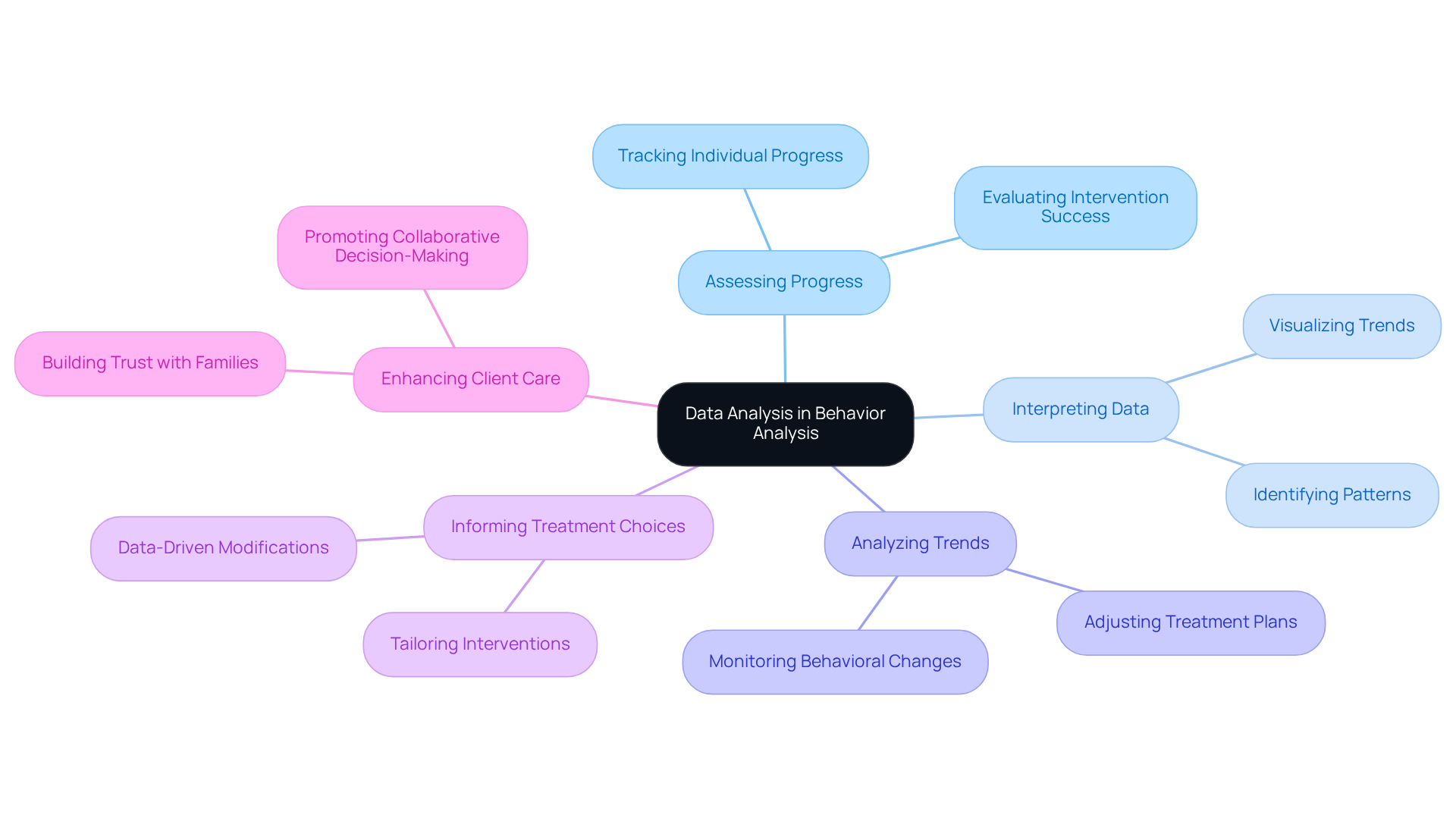
BCBAs must possess exceptional problem-solving skills to create tailored interventions that meet the unique needs of each individual. This involves:
Efficient problem-solving not only enhances outcomes for individuals but also elevates the overall effectiveness of ABA therapy. Are you facing difficulties in hiring qualified BCBAs? Consider how Hire ABA can and connect you with skilled professionals.
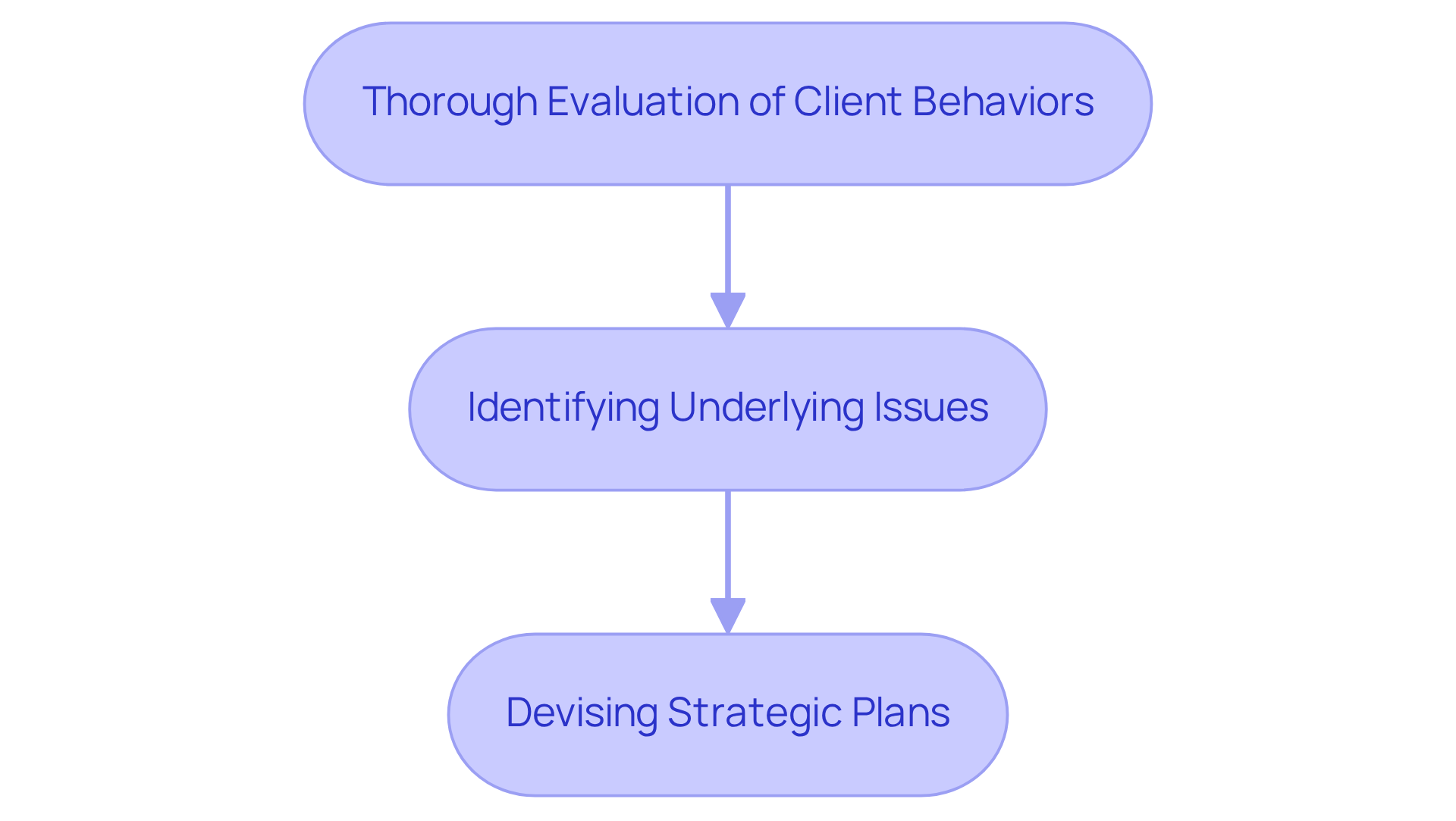
Ethical decision-making stands as a cornerstone of professional practice for behavior analysis jobs. Practitioners must be thoroughly acquainted with the ethical guidelines established by the Behavior Analyst Certification Board (BACB) and diligently apply these principles in their behavior analysis jobs.
Why is this crucial? Upholding not only guarantees that clients receive quality care but also ensures that practitioners maintain their professional integrity, even in the face of challenging situations. This commitment to ethics is not just a requirement; it is a defining characteristic of exemplary behavior analysis jobs.
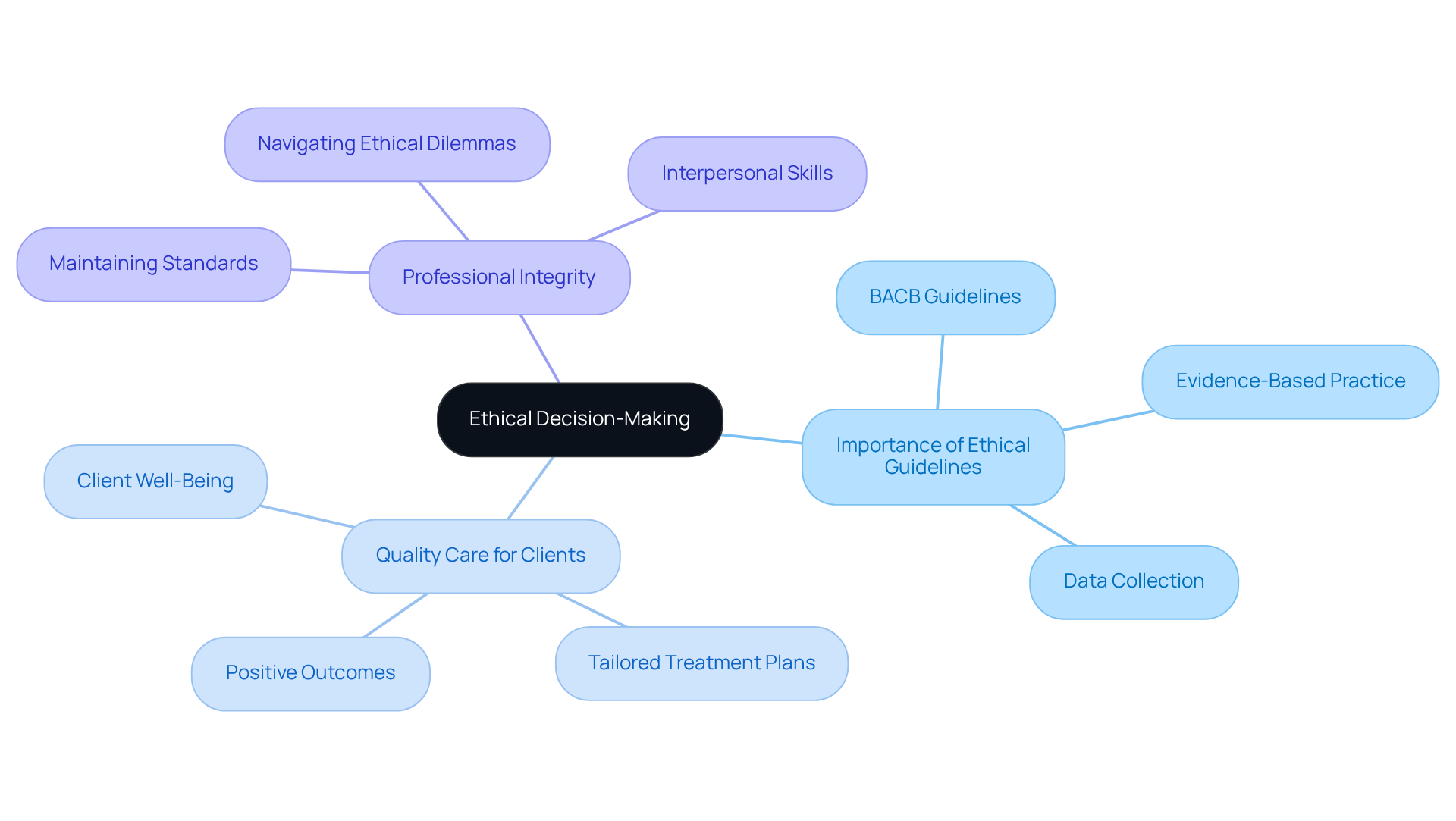
In a rapidly growing field, the demand for behavior analysis jobs, particularly for board-certified behavior analysts (BCBAs), is projected to increase by 25% over the next five years. This statistic underscores the critical need for effective collaboration among professionals in behavioral analysis jobs, including educators, psychologists, and healthcare providers. Strong collaboration skills are not just beneficial; they are essential for successful teamwork, enabling seamless communication, coordination, and shared decision-making.
As the landscape of ABA therapy evolves, the ability to work within multidisciplinary teams becomes increasingly vital for those in behavior analysis jobs. By fostering collaboration, these teams can develop comprehensive and efficient treatment strategies that address all aspects of an individual's needs. This holistic approach ensures that behavior analysis jobs enable behavior analysts to be well-positioned to seize new opportunities in leadership and adaptable roles.
Are you facing challenges in hiring qualified professionals? Consider how partnering with Hire ABA can , connecting you with the best talent in the field. With a focus on collaboration and expertise, Hire ABA is your reliable solution for building a strong team that meets the growing demands of ABA therapy.
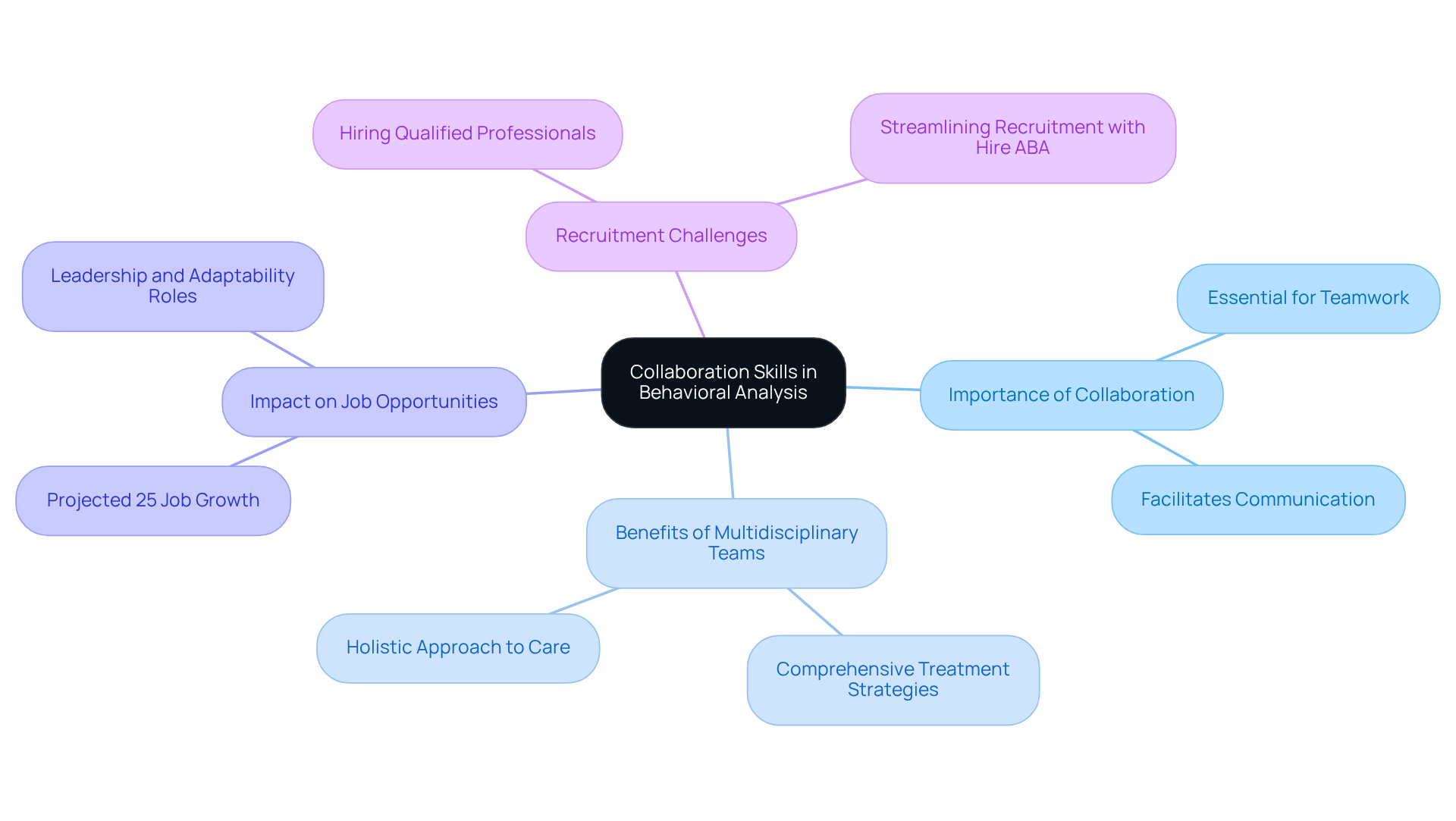
In the ever-evolving landscape of ABA therapy, , particularly for Board Certified Behavior Analysts (BCBAs), are in high demand. Adaptability is crucial; BCBAs must respond to the shifting individual needs and circumstances of their clients. This often necessitates:
Such flexibility in approach not only ensures that interventions remain relevant but also significantly enhances their effectiveness. Ultimately, this adaptability leads to improved outcomes for those served, reinforcing the critical role of BCBAs in the therapeutic process.
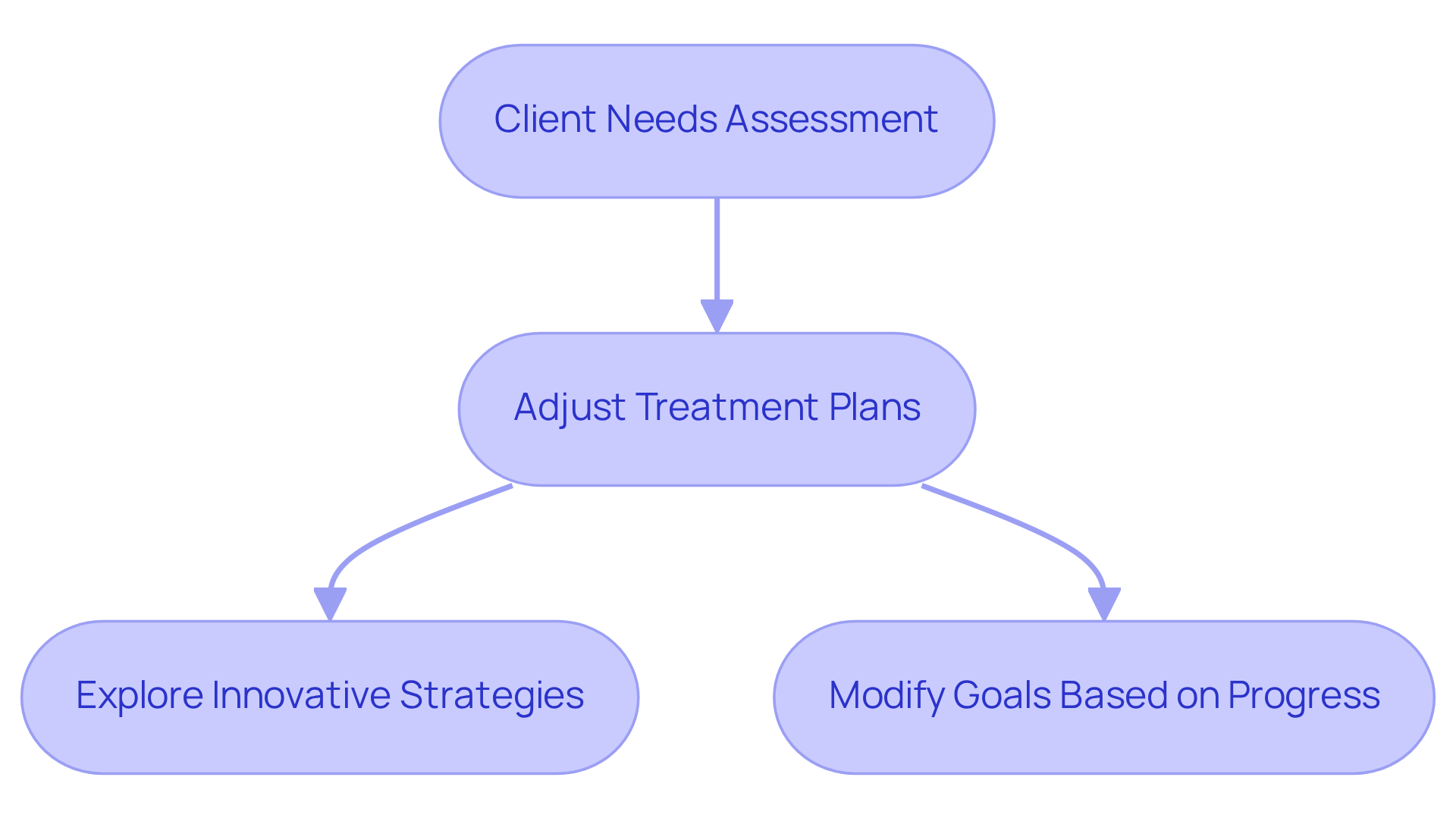
The domain of Applied Behavior Analysis is experiencing significant growth, underscoring the critical need for among Board Certified Behavior Analysts (BCBAs). In a field where demand is ever-increasing, engaging in professional development opportunities, attending workshops, and keeping abreast of the latest research are essential for maintaining competence and enhancing practice. By committing to continuous education, behavior analysts can guarantee the delivery of the highest standard of care to those they serve. This dedication not only elevates their professional practice but also reinforces their credibility in the field.
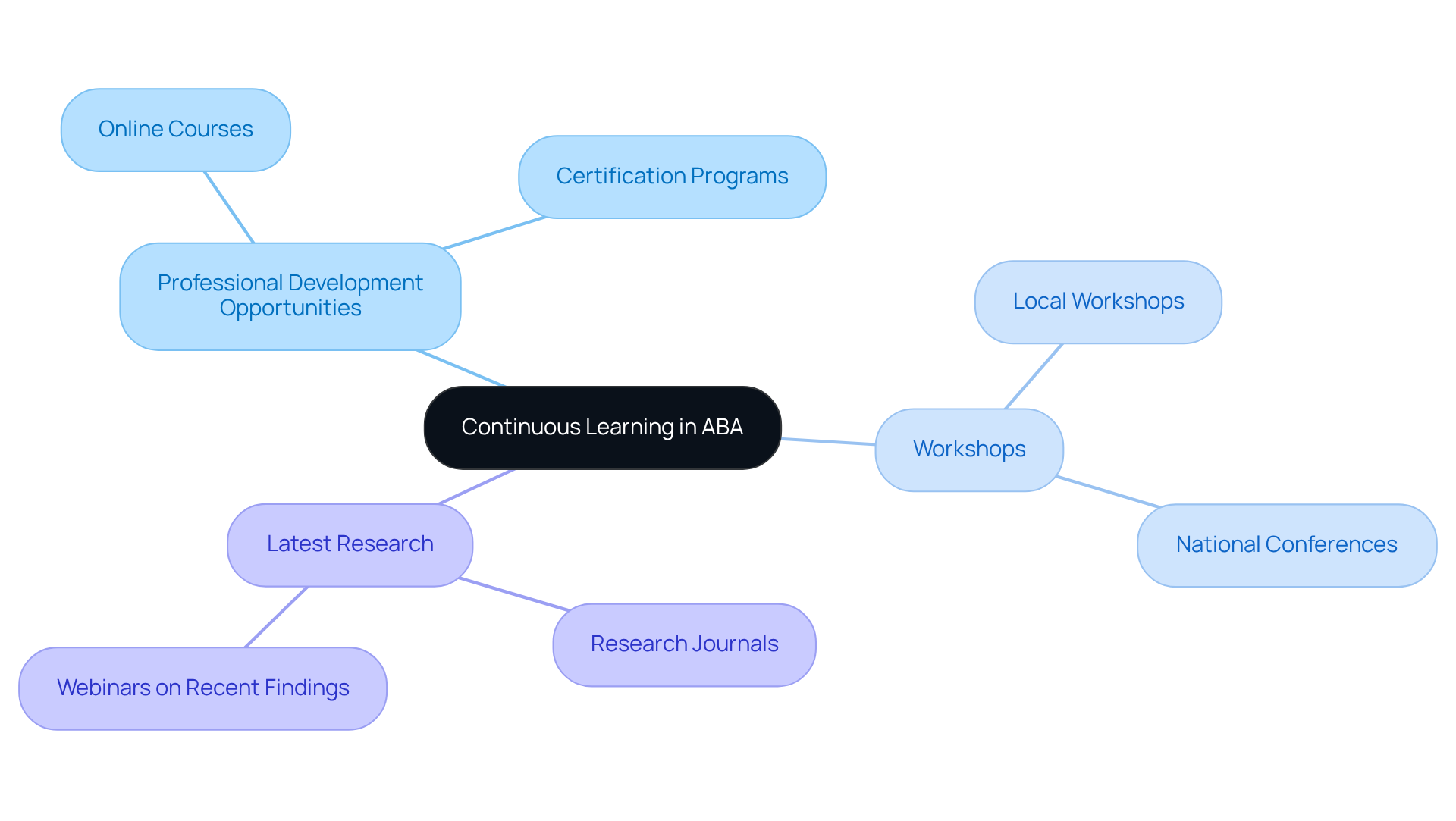
Cultural competence is paramount for Board Certified Behavior Analysts (BCBAs) aiming to effectively assist individuals from diverse backgrounds. This competency encompasses an awareness and respect for cultural differences that can significantly influence individual behaviors and their responses to interventions.
For instance, the implementation of culturally sensitive interventions can yield more personalized and effective treatment plans. Dr. Stephen Shore aptly stated, "If you’ve met one individual with autism, you’ve met one individual with autism," underscoring the uniqueness of each person's experience.
Behavior analysts who actively engage with individuals' cultural contexts are better equipped to cultivate trust and rapport—elements that are essential for successful therapeutic outcomes. By comprehending the distinct backgrounds of their clients, BCBAs can customize their approaches, ensuring that interventions resonate personally and address specific cultural needs.
An illustrative example is the use of social skills task boxes, which have proven effective in teaching autistic students vital social skills. This demonstrates how culturally sensitive strategies can enhance therapy, not only improving its effectiveness but also fostering a more inclusive and respectful environment.
Ultimately, this leads to more in the field of Applied Behavior Analysis.
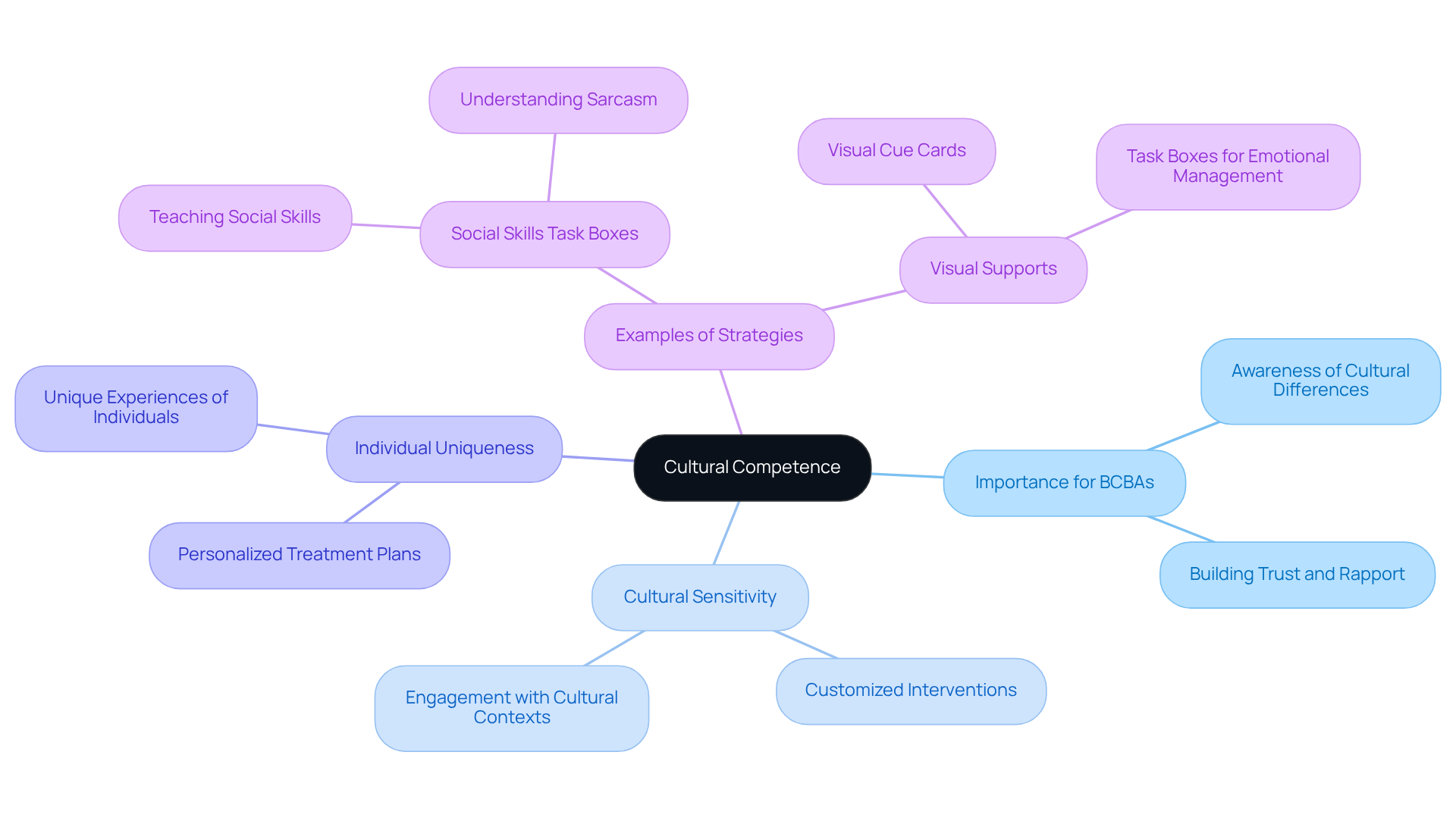
In the rapidly evolving field of behavior analysis, the demand for Board Certified Behavior Analysts (BCBAs) is soaring. Mastering essential skills is crucial for achieving success and improving client outcomes. Competencies such as:
are not just beneficial; they are vital. Each of these skills enhances the effectiveness of BCBAs, ensuring they meet the diverse needs of their clients.
Have you considered the challenges in hiring qualified professionals? Specialized recruitment platforms like Hire ABA can significantly streamline the hiring process for behavior analysis jobs, addressing this growing demand. By focusing on skill development and fostering a collaborative environment, organizations can better equip their teams to navigate the complexities of ABA therapy. Moreover, understanding and respecting cultural differences allows BCBAs to create more personalized and effective treatment plans, ultimately leading to improved therapeutic outcomes.
As the landscape of behavior analysis continues to evolve, embracing these essential skills and leveraging specialized recruitment tools is paramount. Organizations and practitioners alike must prioritize ongoing education and adaptability to stay ahead in this expanding field. By doing so, they not only enhance their professional practice but also contribute to a more effective and inclusive approach to behavior analysis. This commitment ensures that all clients receive the highest standard of care. Take action now—integrate these insights into your hiring strategy and witness the transformation in your practice.
What is Hire ABA?
Hire ABA is a specialized recruitment platform designed to simplify the job search for Board Certified Behavior Analysts (BCBAs) by matching them with behavior analysis jobs that align with their qualifications and career aspirations.
How has the demand for behavior analysis jobs changed recently?
The demand for behavior analysis jobs has surged, with job listings for BCBAs increasing by 58% in 2024, surpassing 103,000 positions.
What are the benefits of using Hire ABA for employers?
Employers benefit from a focused talent pool, which enhances the efficiency of talent acquisition and helps address the challenge of unfilled roles in behavior analysis.
How does Hire ABA benefit job seekers?
Candidates enjoy a more tailored job search experience that aligns with their qualifications and career goals, leading to quicker job placements.
What is the projected growth rate for the profession of behavior analysis in the coming decade?
The profession of behavior analysis is projected to expand by 22-23% over the next decade.
Why is mastering core principles and techniques of Applied Behavior Analysis (ABA) important?
Mastery of ABA principles, such as reinforcement, punishment, and behavior modification strategies, is crucial for creating effective and tailored interventions that lead to improved outcomes for clients.
What role do communication skills play for BCBAs?
Excellent communication skills are essential for BCBAs to effectively interact with individuals, families, and multidisciplinary teams, promoting trust and rapport necessary for successful therapeutic relationships.
How can effective communication impact the hiring process for behavior analysis jobs?
Recognizing the importance of communication skills can enhance the recruitment process by ensuring that teams communicate effectively and foster a collaborative environment.
Our expert recruitment strategies and AI-driven sourcing ensure that you receive top-notch candidates quickly, without compromising on quality. Whether you’re looking for BCBAs, Clinical Directors, or RBTs, we’ve got you covered.